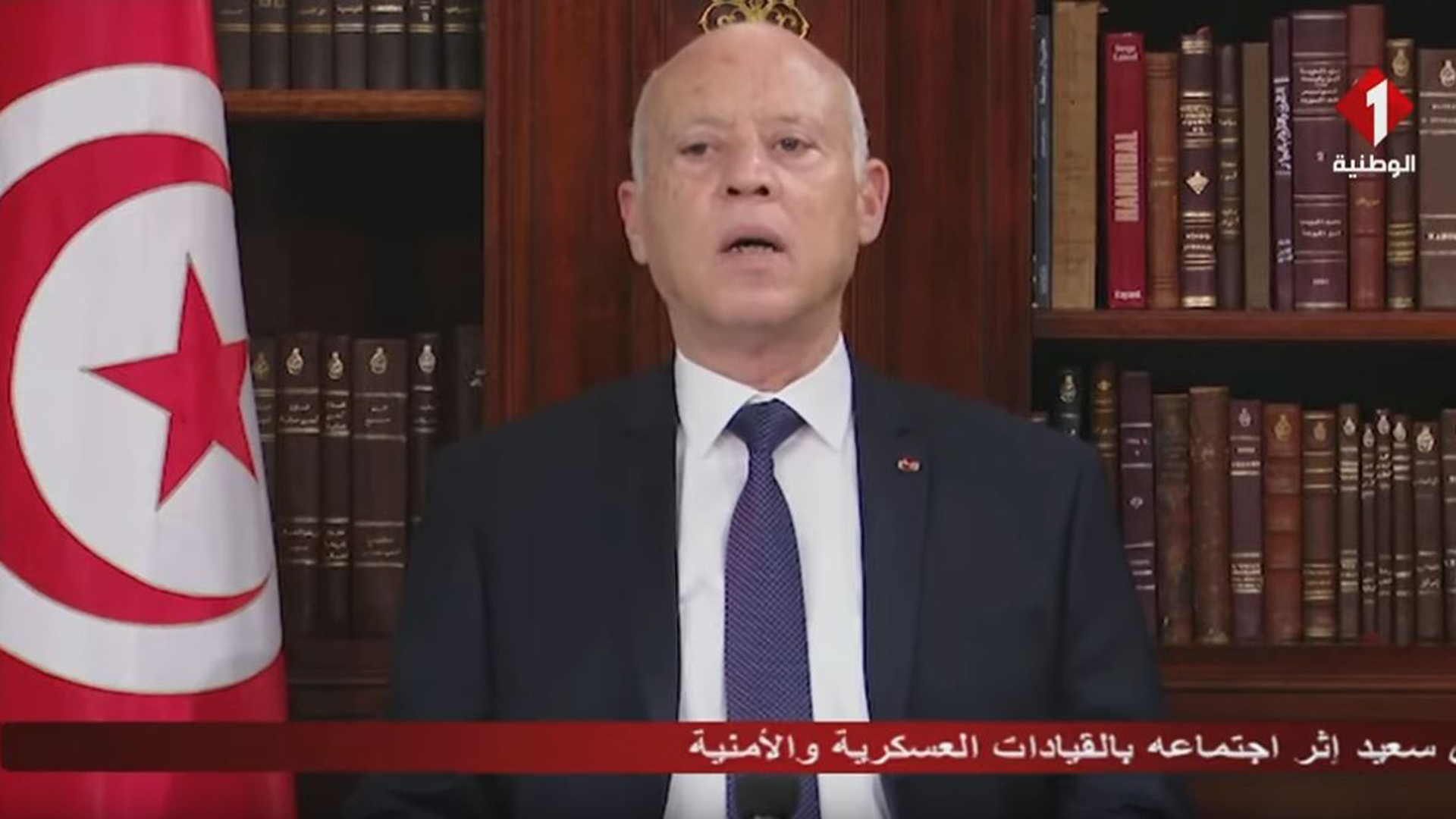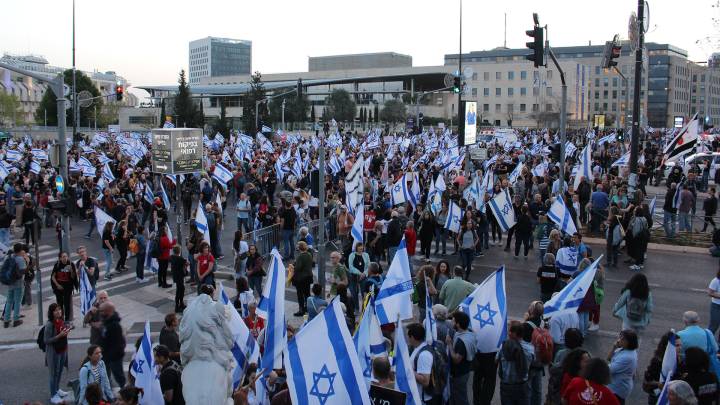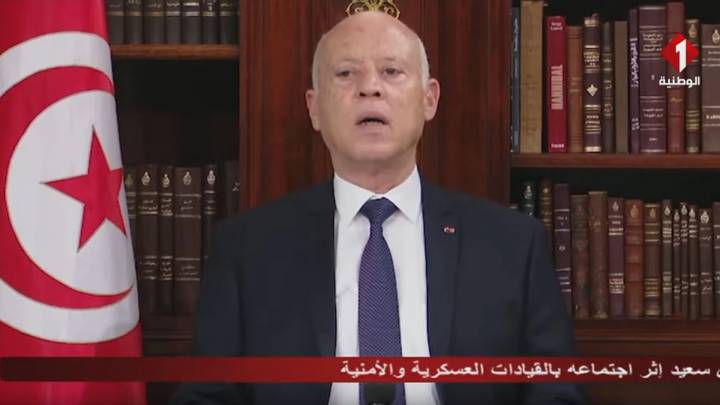Corruption, the deteriorating struggling economy, and the charades of parliamentarians force Tunisians to accept the president’s decisions, even if it’s a coup, argues Sabrine Chahbi.
Like the youth in most of the Arab world, Tunisians are indifferent to the political life in their country and elsewhere. This indifference is the result of old policies and new successive disappointments, which generated in them ignorance and coldness towards what is happening on the Tunisian political scene. Although they played a key role in the Tunisian revolution, the successive political, economic and social failures that accompanied the democratic transition in Tunisia deepened their indifference and stagnation.
The sudden rise of Kais Saied and him running for president changed the equation for many Tunisians; the retired university professor of constitutional law and resident of the popular “Menihla” neighborhood in Tunis was up against media mogul Nabil Karoui, who had been in jail during the elections, arrested on charges of money laundering and tax fraud. Saied’s candidacy brought the youth back to the ballot boxes and reignited their interest in political life because they believed Kais to be serious, honest and uncorrupted.
They pinned their hopes on him and trusted that his mandate would bring about change. Indeed, Kais Saied won the presidential elections with more than 72% of the vote, according to the electoral commission, with 2.77 million Tunisians voting for him, most of whom are young people between the age of 18 and 25, according to a poll conducted by the Sigma Conseil research group.
After Kais Saied’s victory in the elections, Tunisians have been waiting for the promised change in fighting corruption, eliminating nepotism and achieving justice and development for the marginalized interior regions, whose people have been suffering from poverty and unemployment for many years.
More than a year and a half has passed since Saied took over power without any significant change in the country, the situation has even worsened, especially with the Corona pandemic threatening public health and disrupting economic activity, adding to a rising unemployment rate and cutting incomes in an already troubled country with a collapsing economy.
Thus, a sense of disappointment, despair and failure began to penetrate the hearts of Tunisians again. In fact, the president improvised positions, empty promises and his vague speeches about conspiracies being hatched internally and externally against Tunisia, without disclosing any details about who would be behind them and what these conspiracies were, thereby confusing Tunisians, who started questioning his ability to lead the country and their political choices once again.
Displays of violence and fights between the representatives, have disgusted Tunisians with political life and politicians.
Also, the political disputes in parliament, displays of violence and fights between the representatives, have disgusted Tunisians with political life and politicians in their country. However, despite the decline of his popularity, Kais Saied still led the polls with 53.3%, according to an opinion poll conducted by Sigma Conseil in March 2021.
Many activists had called on social media to go out on the streets for massive demonstrations on the 25th of July, the Republic Day in Tunisia, to demand the government step down. This popular and spontaneous youth movement was supported and applauded by parts of civil society and some politicians that have also called for change. Despite the spread of the Corona pandemic in the country, fears of infection, in addition to temperatures exceeding 45 degrees in most of the country, hundreds of protestors took to the streets in each of the large cities to demand the overthrow of the government, which had repeatedly failed politically, economically and socially to get the country out of the suffocating crises it is going through.
According to videos circulated on social media, the protesters carried Tunisian flags and shouted slogans demanding that Prime Minister Hichem Mechichi quit and parliament be dissolved. They chanted “The people want the fall of the regime,” and “No fear, no horror. The power is in the hands of the people,” “No to compensation, corrupt government.”
Other clips also showed protesters storming offices of the Ennahda movement, the Islamist party with the largest share of deputies in parliament. The protestors set fire to some of the party’s local headquarters and burned the party flag, replacing it with the Tunisian flag in a symbolic scene reminiscent of the January 14 revolution when the headquarters of Ben Ali’s Democratic Constitutional Rally Party had been set on fire.
84% of Tunisians support the president’s decision to dismiss Mechichi and 86% support freezing parliament.
On the night of Sunday, July 25, President Kais Saied’s speech was broadcast live on the Tunisian Presidency’s Facebook page, while national television was showing an entertainment series. The broadcast of the series was interrupted to show the speech moments after the president announced the freezing of parliament. The speech was unexpected and surprising to all Tunisians.
A number of “exceptional” decisions were announced by the Tunisian president, among them freezing the work of parliament, lifting the immunity of MPs, dismissing Prime Minister Hichem Mechichi and assuming executive power with the help of a new prime minister. Saeid cited Article 80 of the constitution, arguing it allowed him to suspend parliament if the country is in “imminent danger”.
His decisions were welcomed by many Tunisians who erupted in celebration in the streets despite a nightly curfew. A festive atmosphere manifested in Habib Bourguiba Street in the capital, and in other cities, and even on social media, as an expression of Tunisian’s support for the president’s decisions and their support for Saied in this sensitive stage in Tunisia’s history. However, his opponents in parliament immediately accused him of staging a coup, while some others questioned the constitutionality of his move.
According to an opinion poll conducted by the Emrhod Consulting firm between July 26 and 28, 84% of Tunisians support the president’s decision to dismiss Mechichi and 86% support freezing parliament.
The opinions of most Tunisians shared on social media indicate that they refuse to delve into the constitutionality of these decisions.
The devastation that Tunisia has reached today, the stifling crises it is experiencing at all levels, the anger over the government’s handling of a massive recent spike in Covid cases and its blatant inability to find solutions to the deteriorating situation in which Tunisians and the state have been floundering for at least a decade, have prompted Tunisians to protest and to demand a radical change that will bring Tunisia out of its current situation, to a better future.
In addition, the ten years in which the Ennahda party took control of power within the framework of political alliances, have been a failure. Corruption, the deteriorating struggling economy, and the charades of parliamentarians force Tunisians to accept the president’s decisions, even if it’s a coup, as described by some. The opinions of most Tunisians shared on social media indicate that they refuse to delve into the constitutionality of these decisions.
What counts for them is that Saied’s actions are a response to the demands of a people fed up with their own political elite. In their view, these are exceptional decisions that express the convergence of the people’s will with the president’s desire to correct the path of the revolution. It is rare for a nation to rejoice in freezing the work of their elected parliament. However, the majority of Tunisians revolted against their political elite and supported the decisions of their president to overcome the tragic situation that Tunisia has reached ten years after the Jasmine Revolution.
It is still too early to know the outcome of these decisions and their impact on the general situation in Tunisia. Regardless of their constitutionality and how things will evolve in the future in this country that still carries the dream of the Arab Spring; Tunisians have shown the world once again that they want change and that Tunisian youth, forgotten since 2011, succeeded where all opposition failed.




